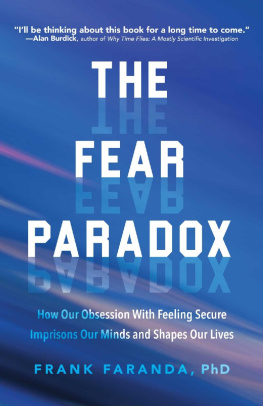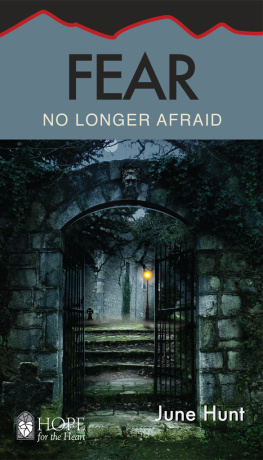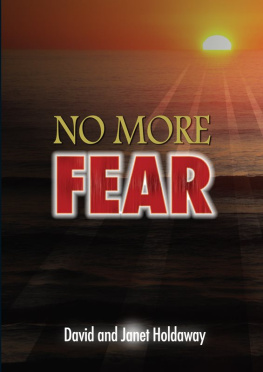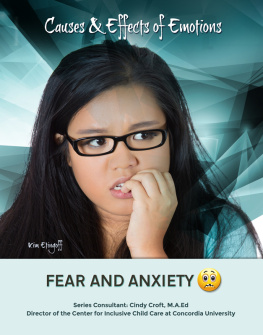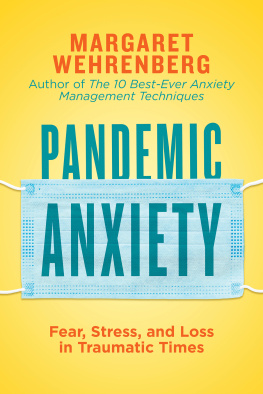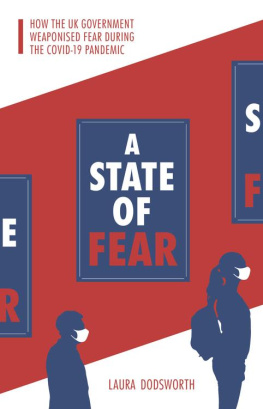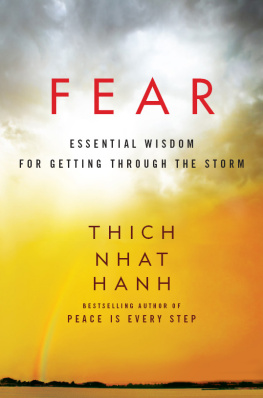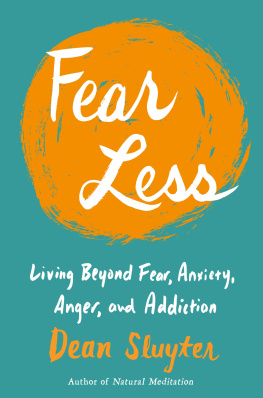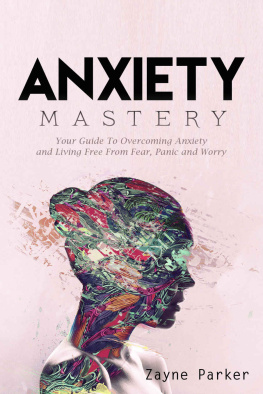Praise for
The Fear Paradox
A delightfully fearless and deeply sensitive examination of that most primal and formative human experience. Ill be thinking about this book for a long time to come.
Alan Burdick, author of Why Time Flies: A Mostly
Scientific Investigation
Frank Faranda is an accomplished student of the mind, and especially of the interplay between fear and imagination. Hes not only a great thinker and writer, but also a terrific storyteller, keen observer of humanity, and gentle mentor on how we can do better.
Douglas Rushkoff, bestselling author and Professor of Media Theory and Digital Economics at CUNY/Queens
A tour of psychoanalytical thinking around anxiety and how fear drives us, this is an insightful and informative book that challenges us to face our vulnerabilities so that we can be better and wiser.
Dr. Stephen Joseph, psychologist at the University of Nottingham and author of Authentic: How to be Yourself and Why It Matters
The Fear Paradox
How Our Obsession
with Feeling Secure
I mprisons Our Minds
and Shapes Our Lives
Frank Faranda, PhD
Coral Gables

Copyright 2020 by Frank Faranda, PhD
Published by Mango Publishing Group, a division of Mango Media Inc.
Cover and Interior Design: Jermaine Lau
turtle by anggun from the Noun Project
Mango is an active supporter of authors rights to free speech and artistic expression in their books. The purpose of copyright is to encourage authors to produce exceptional works that enrich our culture and our open society.
Uploading or distributing photos, scans or any content from this book without prior permission is theft of the authors intellectual property. Please honor the authors work as you would your own. Thank you in advance for respecting our authors rights.
For permission requests, please contact the publisher at:
Mango Publishing Group
2850 S Douglas Road, 2nd Floor
Coral Gables, FL 33134 USA
For special orders, quantity sales, course adoptions and corporate sales, please email the publisher at or +1.800.509.4887.
The Fear Paradox: How Our Obsession with Feeling Secure Imprisons Our Minds and Shapes Our Lives
Library of Congress Cataloging-in-Publication number: 2020933477
ISBNs: (p) 978-1-64250-057-8 (e) 978-1-64250-058-5
BISAC: HIS035000, HISTORY / Study & Teaching
Printed in the United States of America
To my wife and son
Table of Contents
Fear can transform us in ways that fundamentally alter how we perceive our world.
Henry L. Chambers Jr.
One summer, not so long ago, I got a taste of something long forgottenthe joy of riding waves. Im not talking about tame little crests, Im talking about waves that slam you into the sand and carry you for twenty yards. This was what I found one afternoon at Marconi Beach on Cape Cod, riding waves with my twelve-year-old son.
I was already familiar with the waves at Marconi. I had spent a summer on Cape Cod when I was in my twenties, and rode those waves many times. In those days, I was much stronger, but even coming back as an older man, the same excitement drew me in. To my surprise, my son ventured into the water with me. He doesnt typically like riding waves, but I think he could see everyones enjoyment and decided to jump in. People from age ten to sixty were out there having a ball. I wasnt consciously thinking that the joy I was feeling riding those waves was a result of the proximity to danger, but in hindsight, I suppose it was.
For me, with my son, I was in heaven. We had each ridden about six waves when, all of a sudden, we looked out toward the horizon and saw a huge swell emerging. Along with this swell came a powerful undertow that made it difficult to move. I looked over at my son, and he was preparing to ride. I dove into the wave as it came crashing in on me, and I rode it to the shore. It was big and it threw me about. When I was able to get up, I looked over and saw my wife standing on the beach, pointing at my son. Slowly I made out her words: Hes hurt! She was pointing and I was trying to wipe the water from my eyes to focus. I looked at my son. He was standing upright, holding his arm. That was when I saw it. His arm was bent at the elbow, but bent the wrong way. I ran to him and saw the bulge on his elbow. I saw his face: the pain, the fear. The exhilaration in me turned sour in my stomach, and after that it was simply one step after another in a desperate, terrified fog.
The arm was eventually set without surgery, and, after a couple of difficult months of rehab, my son was good as new. My wife and I talked to him at various points in the months that followed about what had happened and his feelings. But the one emotion that I never mentioned having was the joy I felt before that last wave hit. It felt wrong to associate joy with such a frightening experience. I couldnt have imagined discussing it with my wife, let alone my son. After about a year, however, he and I were in the car, and it came up. I dont remember what prompted it, but there it was. I confessed that riding those waves had brought me a joy that I had not felt for a very long time. We stopped at a light, and I looked across at him cautiously. He turned to meet my gaze. A smile slowly edged up his face, and he nodded. I know, he said, me too. That was it. That was all we needed to say. Even though we both knew the result of that day, we could not deny the exhilaration that had preceded it. Joy had unfortunately brought us just a little too close to danger. But why had it? Why does joy often come when we are nearest to the edge of fear?
For us as human beings, fear is a complicated phenomenon. Much of why I began to study fear was an attempt at unraveling these mysteries, both for myself and my patients. As a psychologist, I sat every day listening to the stories of suffering caused by fear, and I began to see that fear was far more devastating than I had ever imagined.
Unlike other animals fear, human fear comes in strange shapes and sizes. Something about who we evolved into has dramatically changed the role that fear plays in our livesnot only personally, but historically and societally as well. Rather than the trusted ally in survival that fear is for other animals, fear, for us, is often something we guard against.
In 1933, Franklin Delano Roosevelt cautioned us about fear. He spoke those now famous words in his first inaugural address to a nation crippled by despair and longing for hope. The recovery from the economic collapse of 1929 had stalled, and FDR knew that, if the country was to get out of its current economic morass, it needed to come to terms with the emotional underpinnings of such a collapse. FDR understood that fear played a prominent role in both the despair and the potential for recovery. He knew that, at times, fear cripples and corrodes, even if the perception of danger is ultimately irrational. FDR spoke to this quite eloquently when he said, let me assert my firm belief that the only thing we have to fear is fear itselfnameless, unreasoning, unjustified terror that paralyzes needed efforts to convert retreat into advance.
This paralysis of which FDR spoke is something most of us have experienced at some point in our lives. This is what countless self-help books attempt to free us from. But what I have come to wonder about is why fear is so difficult for us in the first place, and how it became so different for us Homo sapiens . To find answers to these questions, I looked first to my patients. From there, I began a long journey that took me deep into the history of how we became who we are today. Neurobiology, history, sociology, evolutionary biology, cognitive science, psychoanalysis, and comparative psychology all contribute to what I am exploring here. This book is not a how to, but a how come?
Next page
